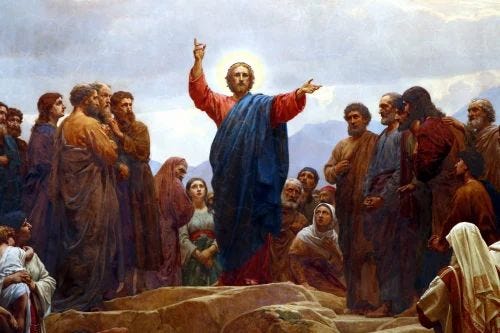“Do not think that I have come to abolish the law of the prophets. I have come not to abolish but to fulfill.” Matthew 5:17
Much has been said about today’s Gospel. I wrote about it last year as well. Today I want to dive into St. Thomas’ Commentary on Matthew and look at his five ways in which Christ fulfills the law and the prophets. First, I want to explore the idea of fulfillment as meaning completion. Our Lord comes to complete the law and the prophets as they were laid out in the Old Testament. The law and the prophets were anticipatory of the coming of Christ, they were not ends in themselves. Thus, this means that the providential ordering of God tended toward their completion in Christ when He was to become Incarnate. To this end, St. Thomas brings our attention to the five ways in which Our Lord fulfills the law and the prophets.
“First, because those things that were prefigured in the law and the prophets concerning Christ, he fulfilled in his actions: what is written must be fulfilled in me (Luke 22:37).”1
The entire Old Testament is a prefiguring of Christ in some form or fashion. The law and the prophets are given to the people to prepare them for the coming of Christ. Theoretically, God could have sent His Son in the generation immediately after Adam and Eve. There was nothing in essence that kept God from doing this. But, in reality, man was not ready to receive the Messiah and so God slowly prepared man for the coming of God Incarnate by revealing the coming of Christ through the law and prophets. Each prophecy and individual law is completed in Christ and His sacrifice.
“Second, by observing the legal requirements to the letter, when the fullness of time had come, God sent his son (Gal 4:4).”2
Christ kept the law to the very letter. This is seen from the moment that He was circumcised and named in the temple eight days after birth3 to His presentation in the temple and offering as a priest.4 Most especially, we can see Christ obeying the law through the celebration of the Passover and other Jewish feasts. All of this, as St. Thomas says, was so Christ could not be rejected by His people based on not observing the law.5
“Third, by working through grace, which the law of nature could not do: for every law is for the sake of making us just men, but Christ did this by the Holy Spirit: for what the law could not do, God has done by sending his own Son (Rom 8:3).”6
Here we see the very important distinction between the law of nature and the law of grace, also referenced in some places as the order of nature and the order of grace. The Law of Moses did not justify in and of itself. Only the grace of Christ can do this, poured out from the cross and given to mankind, primarily through the sacraments. In this way, we are lifted out of the order of nature and into the order of grace so that we can spend eternity with God. Christ is the author of this divine life.
“Fourth, according to Augustine, by satisfying for the sins by which we were made transgressors of the law; hence having borne the transgression he is said to have fulfilled the law: whom God proposed to be a propitiation (Rom 3:29).”7
Through sin, man has transgressed the law of God. Each transgression that is mortal, infinitely offends God since He is infinite. This infinite debt that is incurred from Original Sin and Actual Mortal Sin is unable to be paid by the finite creature of man. Thus, in His goodness and mercy, God sent His Son to make expiation for our sins and to pay the infinite debt that we could not. The Infinite God took a finite nature to Himself and became man so that our sin could be expiated. This was foretold in the Old Testament and completed through Jesus Christ.
“Fifth, by applying certain perfections to the law which were either for the understanding of the law or for the greater perfection of justice, for the law brought nothing to perfection (Heb 7:19); and these things seem to be the intention of Christ, since, when he made mention of all legal restrictions, he added be you therefore perfect (Matt 5:48).”8
St. Thomas quotes St. Paul to the Hebrews in saying that the law by itself does not bring anything to perfection. This is because grace is needed for man to reach perfection. Thus, we are in need of Christ, through the Incarnation and Redemptive act to pour out grace upon our fallen human nature. It is only through that grace that we can truly be perfect as our heavenly Father is perfect.
St. Thomas Aquinas, Commentary on the Gospel of Matthew, C.5, L.6, 469.
Ibid.
Cf. Luke 2:21.
Cf. Luke 2:22-24.
Cf. Summa Theologiae IIIa q. 37, a. 1.
St. Thomas Aquinas, Commentary on the Gospel of Matthew, C.5, L.6, 469.
Ibid.
Ibid.



As always your explanations are clear and easy to understand!!!
Actually, Christ alone was able to have the righteousness of the Law by performing it because did not have the human weakness from the law of sin that we all share. He was able to perform it perfectly. We also have the righteousness of the Law when Christ’s Spirit is within us because He can then share it with us. Under grace, we don’t have to perform it (cf. Romans 8:1-4; Colossians 2:20-23).